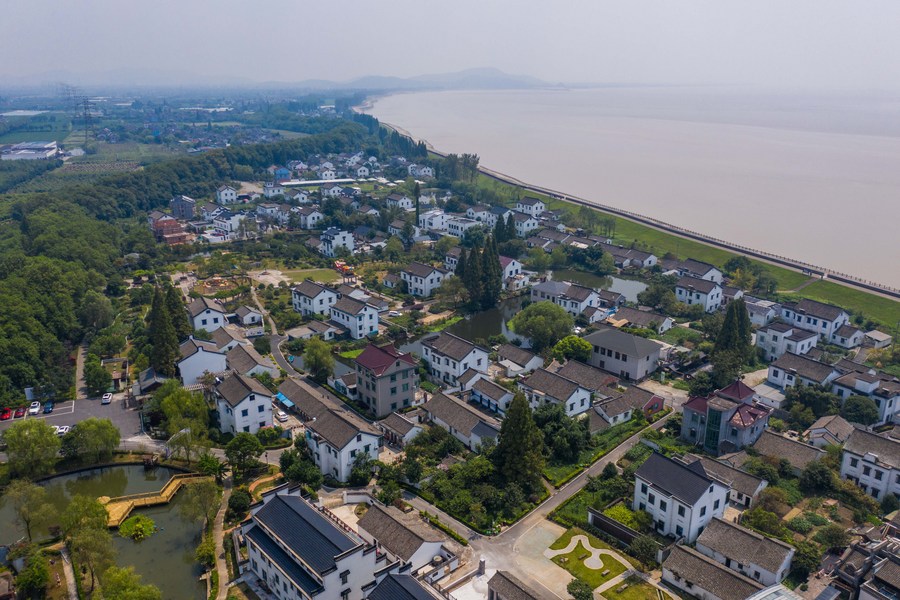Prosperity For All

China’s vision of common prosperity offers a shared foundation for a stronger Sino-African partnership.
China is embarking on a new path. Having eradicated the scourge of extreme poverty among its people and having successfully built a moderately prosperous society, China, under the leadership of President Xi Jinping, is now moving toward high-quality development under the banner of “common prosperity.”
The concept of common prosperity was popularized and articulated at length by Xi in the latter part of last year as the guiding vision and strategy which will underpin the building of a great modern socialist country.
The central thrust of the common prosperity concept is the promotion of all-round human development and the reduction of socio-economic inequalities in Chinese society. In short, common prosperity seeks to create conditions for every one of the 1.4 billion Chinese people to thrive in their chosen fields and make a meaningful contribution to the development of China.
This article compares China’s “common prosperity” concept and Africa’s Ubuntu philosophy and discusses how their ideological and cultural compatibility may further reinforce the Sino-African partnership.

Deciphering common prosperity
In an essay titled Making Solid Progress Toward Common Prosperity, Xi acknowledges that while China has won its fight against absolute poverty, unbalanced and inadequate development remains a prominent problem in China. In particular, there are large disparities in both development and income distribution between rural and urban areas, and between regions.
Statistics show that people living in urban areas earn more than rural dwellers. This means that China’s tremendous economic growth has not been shared by the whole population. Therefore, common prosperity is the preferred strategy to address these challenges.
According to Xi, “Bringing prosperity to all is an essential requirement of socialism, as well as an important feature of Chinese-style modernization.”
The essay notes that by the middle of this century, common prosperity will be basically achieved, while gaps of individual incomes and actual consumption levels will be narrowed to an appropriate range. “To reach these goals, we must promptly formulate an action plan for promoting common prosperity, and devise rational and workable systems of targets and methods of evaluation that suit China’s national conditions.”
The development of human capital and participatory development will ensure high-quality development as envisioned under common prosperity. Public enterprises will continue to play an important role in the economy, while legitimate private enterprises will flourish.
Moreover, the rich are called upon to help those who are not yet rich. The message is getting through to the rich who donated billions of dollars to charitable causes last year.
While emphasizing the need for building people’s livelihoods, Xi cautioned that the government cannot take on everything. Instead, its main responsibility should be strengthening the development of projects related to public well-being that are fundamental, inclusive, and focused on meeting basic needs.
Inclusive development, expansion of the middle class, improved access to quality public services for the poor (education, health care, housing and income grants), regulation of high incomes (progressive tax reform) to limit social polarization and inequality will form some of the priority areas under common prosperity.
Moreover, common prosperity will entail mass education on patriotism and collectivism while also giving special attention to farmers and rural areas.
Through common prosperity, China seeks to pursue a more just development path guided by moral values and a practical program of action.

Shared vision
China’s vision of common prosperity has a lot in common with Africa’s culture and ideology of Ubuntu and therefore creates an impetus for cementing Sino-African relations.
Africa also faces the same challenges of inequality, poverty and corruption. The principles of Ubuntu such as communality, dignity, equality, social justice, compassion, solidarity and morality are also espoused under the common prosperity vision. Ubuntu has long constituted the organizing principle of African societies and forms the moral and ideological basis for Pan-Africanism.
Just like China’s common prosperity, Ubuntu is guided by the spirit of community, togetherness and socialism. Ubuntu rejects ill-gotten wealth and excessive social inequalities while advocating a just distribution and allocation of resources throughout society.
As argued by the late former Tanzanian President Julius Nyerere’s Ujamaa, there is no moral justification for excessive socio-economic inequalities as they are the result of the exploitation of man by man. Through excessive income regulation and diligent scrutiny of illegal wealth acquisition, China’s common prosperity is identical to Ubuntu in its denunciation of excessive wealth as an obstacle to social progress.
Nyerere argued that the African social system provided adequate social safety nets to protect people from falling into poverty by ensuring that their basic needs, such as food and shelter, were catered for. Hence both common prosperity and Ubuntu are fundamentally distributive welfare programs that seek to uplift and protect the poor.
Moreover, both philosophies embrace and emphasize the spirit and value of hard work. As Nyerere declared: “There is no such thing as socialism without work.” The social safety nets and welfare programs that are part of Ubuntu and common prosperity are not a substitute for working. Every member of society will have to work for their livelihood. The social system should create the circumstances under which their work can bear fruit.
The values of collectivism and compassion form a critical component in China’s common prosperity and Africa’s Ubuntu. Further, the two philosophies share a cautionary approach to the Western free market system. China’s common prosperity is meant to mitigate and redress some of the adverse effects of the free market system, such as excessive concentration of wealth and monopolistic tendencies, in some of the economic sectors which have intensified social polarization.
Ubuntu is also critical of the individualistic and profit-driven free market system that thrives on exploitation and greed, preferring a collective ownership system that is underpinned by moral and ethical principles.
At the Forum on China-Africa Cooperation last year, China and Africa committed to building a China-Africa Community With a Shared Future. The compatibility of China’s common prosperity with Africa’s cultural ideology of Ubuntu provides a shared foundation for a stronger Sino-African partnership.
Africa has been trying to implement the free market system for decades, but it has failed to yield sustainable growth rates, lower socio-economic inequality, and reduce poverty.
The common prosperity ideal espoused by Xi offers Africa and the world an opportunity to change course from liberal capitalism.
The writer is director of the Center for Africa-China Studies at the University of Johannesburg.
 Facebook
Facebook
 Twitter
Twitter
 Linkedin
Linkedin
 Google +
Google +










